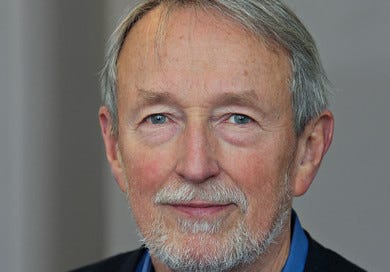Yesterday, UC San Francisco, where my father spent the bulk of his professional life, published an obituary that focuses on his scientific work. This is right and proper. Dad was a distinguished scientist whose work on how cells communicate helped pave the way for many drugs and therapies we rely on today. But I also wanted to publish an obituary that painted a portrait of the man that his friends and family outside of science knew.
Here it is, with apologies to those of you who read this newsletter to hear news about my book:
Henry Bourne, long-time medical researcher at the University of California at San Francisco and member of the National Academy of Sciences, died April 15 following an acute bout of pneumonia. He was 83.
Starting in 1969 when he first arrived at UCSF, Henry spent nearly 40 years studying how cells communicate, both with other cells and within themselves. “He was fascinated by the ways that the cells in our tissues talk to each other and control each other’s behavior in response to various changes in their environment,” says his colleague David Morgan, Vice Dean for Research at UCSF’s School of Medicine. “To pursue this passion, he analyzed the complex protein machines that receive signals on the cell surface and pass those signals into the cell to change their behavior.”
Henry was passionate about his research, which ultimately led to his being elected to the National Academy of Sciences in 1994. After he closed his lab in 2008, he turned to his first love – writing – and published three books, including Ambition and Delight, a 2009 memoir of his life in science, and Paths to Innovation, a 2017 institutional history of UCSF.
His love of science, though great, was no match for his love for his family, and in particular for his wife of 59 years, Nancy, who died in 2021. He and Nancy first met as children in their hometown of Danville, a sleepy cotton mill town in southern Virginia. Nancy liked to tell the story about how, when they were in grade school, he challenged her to a footrace – and then didn’t have the grace to let her win.
Nancy was her school’s Queen Bee while he was its Walking Dictionary, and not first on her impressively long list of suitors. But after he went away to prep school at Phillips Academy Andover, followed by Harvard College (Class of 1960), his persistence won her over, and they married in 1962. Seven years later, they moved to Marin, living in Mill Valley for 43 years before Henry moved to Greenbrae in 2022, following Nancy’s death.
Theirs was a marriage of equals, two funny, ambitious, headstrong people who loved each other madly. After her death at age 81, he helped shepherd her debut story collection, Spotswood, Virginia, toward publication a few months after her death by the Stephen F. Austin University Press. Over the next two years, he worked to compile 37 of her published stories into a new book, Somewhere a Phone is Ringing, which is to be published on what would have been her 84th birthday, May 12, 2023.
Henry will be missed by the many scientists who worked with him at UCSF and by his family, which includes his sons Michael and Randy and his daughter Margaret. Randy and Margaret followed him into the medical profession, both becoming doctors, and Michael followed Henry’s other passion and became a writer. Other surviving family members include Michael’s wife, Eva, and his son, Luke; Randy’s wife, Christine, and his daughters, Claire and Stella; and Margaret’s children Julia and Hank.
There will be a memorial service later this year. In lieu of flowers, please donate to a cause that means something to you. Failing that, please donate to the Democratic Party.
More than anything, though, if my father could still speak, he would ask that no one see his passing as a great tragedy. He knew how lucky his life was and spoke of it often. He had that rare privilege of living exactly the life he wanted, and when it was time for it to end, he faced it the way he faced everything else, with common sense and clarity of purpose. If there is a heaven – and Dad would be the first to tell you he had his doubts – he and Mom are up there, arguing over something they read in a book. What better end could there be?
In other news:
In a week or two, I will send out a separate newsletter about my mother’s new book Somewhere a Phone is Ringing, which collects all 37 of the stories my mother published in her lifetime. The book is due out from Wordrunner Press on May 12.
Sadly, my father will not be able to attend my return engagement at Book Passage Bookstore in Corte Madera on September 30, where I’ll be discussing my debut novel Blithedale Canyon. If you’re in the area, I hope you will be able to come to the event, which is on a Saturday at 1 p.m. and is free and open to the public.




Dear Michael and family,
I was saddened to learn of your father's passing. I have talked about his work in my Human Physiology course at MIT for decades - using one of his papers as a fantastic in class problem that has been loved by students. Thus, he was a successful teacher at MIT as well as UCSF. May his memory be for a blessing. M. Krieger
I want to express my condolences on the passing of H. Bourne. I have used his work to teach for decades. We only had very brief interactions over the years. He was a giant. Many students in my Human physiology course delighted in discussing his work and learned much from him. Thus, he was a successful teacher at MIT as well as UCSF.